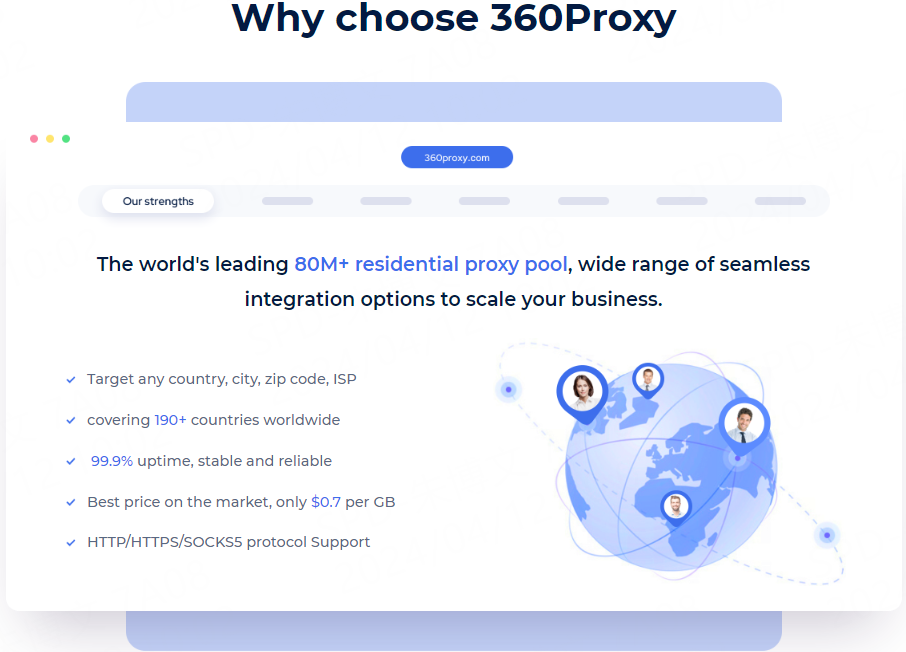Introduction
With the rapid development of Internet technology, proxy IP has become an indispensable tool for many network users. Proxy IP can effectively hide the user's real IP address, providing a strong guarantee for the user's privacy and network security. However, the performance and stability of proxy IPs vary. For users who need to use proxy IPs frequently, it is particularly important to choose a proxy IP with excellent performance and strong stability. This article will conduct an in-depth comparison of the performance and stability of proxy IPs, aiming to help readers better understand and use proxy IPs.
How proxy IP works
Proxy IP is a network service that can forward the user's network request to the target server, and then obtain the response from the target server and return it to the user. In this process, the user's real IP address is hidden, making network behavior difficult to track, thereby protecting the user's privacy. Specifically, the proxy IP encrypts and decrypts the user's network requests to ensure the security of data transmission by establishing a secure transfer station between the user and the target server. At the same time, proxy IP can also help users break through network restrictions and access blocked websites and services.
Performance comparison of proxy IP
1. Speed and latency
There are large differences in access speeds between proxy IPs in different regions, which are mainly affected by network environment, geographical location and other factors. Generally speaking, choosing a proxy IP that is geographically close to the user can significantly improve access speed. In terms of latency, high-quality proxy IPs have lower latency and can meet the needs of users in network applications such as browsing the web and downloading files.
2. Number of concurrent connections
The number of concurrent connections refers to the number of network requests that the proxy IP can handle simultaneously. Proxy IP with high number of concurrent connections can show higher efficiency when responding to a large number of network requests, effectively reduce the burden on the server, and improve the response speed of network applications.
3. Data transfer volume
The amount of data transfer varies between different proxy IPs. When choosing a proxy IP, users should consider the amount of data transmission based on their actual needs. Generally speaking, proxy IPs with larger data transmission volumes can better meet the needs of users in scenarios such as downloading large files and watching high-definition videos.
Comparison of the stability of proxy IP
1. Availability
Availability is one of the important indicators for evaluating proxy IP performance. Highly available proxy IP means that within a specific period of time, users can smoothly access the network through the proxy IP without frequent connection interruptions or inaccessibility. This usually depends on the operating status of the proxy IP server, the network environment, and the level of maintenance and management. In order to improve availability, some well-known proxy IP providers will take a number of measures, such as using high-performance server hardware and regular system maintenance and updates.
2. Stability
Stability refers to the ability of a proxy IP to remain stable under continuous working conditions. A high-quality proxy IP should have good stability and be able to continue to provide stable and reliable network services. Stability is not only related to the performance of the proxy IP, but also directly affects the user experience. A stable proxy IP can reduce network delays, packet loss and other problems, ensuring users can operate smoothly in network applications. In order to improve stability, some proxy IP providers will deploy multiple server nodes around the world to intelligently select the best server for transfer when users access, reducing instability factors in the network transmission process.
Summarize
When choosing a proxy IP, performance and stability are two key considerations. By comparing the performance and stability of different proxy IPs, users can better understand the characteristics, pros and cons of each proxy IP, and then choose the proxy IP that best suits their needs. During the selection process, users should pay attention to the speed and latency of the proxy IP, the number of concurrent connections, the amount of data transmission, availability and stability, etc., to obtain the best network experience.
360Proxy provides 100% real residential proxy resources, covering 190+ countries and regions, and 80M+ residential IP resources. To meet the different needs of users, such as media account management, ESTY and SEO, 360Proxy is a good assistant that can provide huge help!

 Username: Password
Username: Password
 Whitelist IP
Whitelist IP
 Proxy Manager
Proxy Manager
 Google Chrome Extension
Google Chrome Extension





























 Dashboard
Dashboard Sign Out
Sign Out






























 USA
USA France
France Brazil
Brazil Vietnam
Vietnam Spain
Spain









